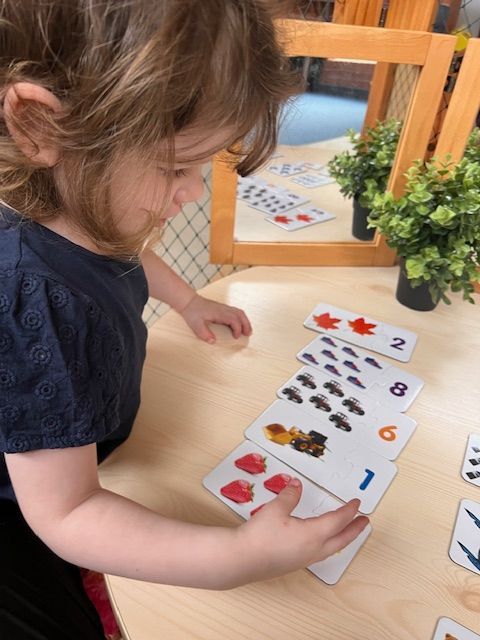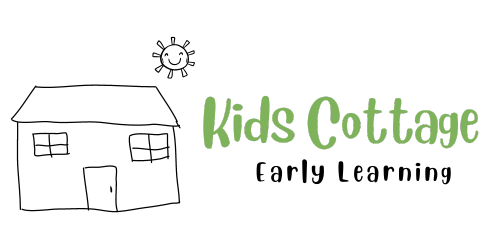About us
Kids Cottage Early Learning is a privately owned centre. The centre is owned by Belinda Aeberhard and her family. Belinda is an Educator herself and has worked in early childhood for 25 years holding a range of positions with her most recent being; managing a local community run preschool. As a mum of 7 children, Belinda has a deep understanding of the emotional journey parents go through when deciding to enrol their children into an early learning centre.
Kids Cottage is a unique centre with an oversized natural playground, caring and educating children aged 9 months to 6 years. In 2024 the centre were awarded a rating of MEETING the National Quality Standards. The centre is known for its caring Educators and homely environment that draws inspiration from the Reggio Emilia approach.

Our Philosophy
Our Mission Statement
We are committed to ensuring that Kids Cottage Early Learning is welcoming and nurturing place for children and their families, a place where each child is nurtured to fulfill their potential, in a stimulating, challenging and safe environment. A place where families, educators, children and community come together to learn and grow.
Children
Children are seen as active participants in creating their own learning and are provided with continuous opportunities to explore and investigate their world and nature that surrounds them. Children are supported to make choices and contribute towards their own learning; and will be encouraged to broaden their skills and interests through play-based teaching practices and experiences.
Each Child’s emotional well-being and social connections are viewed as a priority, as we believe this forms the foundation for intellectual learning. This is supported by Educators forming relationships with children and supporting peer relationships. Educators intentionally support children to learn social skills such turn-taking, sharing, asking for help, recognising and responding to feelings.
We aim to create a natural inclusive environment that fosters a life-long love of learning, sparks curiosity, exploration and values strong respectful social connections.
Families
Kids Cottage Early Learning recognise that families are the primary influence on their child’s learning and development. We will form respectful relationships with families to encourage a trusting partnership that leads to enhancing the potential and growth of their child together.
We value family involvement and aim to build a community spirit that enables rich partnerships and connections that inspire and enhance learning opportunities for children. Family involvement is supported by the information we collect in the enrolment process, orientation visits, information and child goal sheets about your child. You are encouraged to provide us with information about your social, cultural and family traditions to assist with building your child’s network of secure relationships.
We welcome your child to bring in photos for us to display, birthdays, favourite books for us to read, and treasures to show and talk about, these are apart of our intentional teaching strategies we might use to support your child’s sense of belonging within our centre.
We encourage open and transparent communication between our educators and families, with us sharing our insight, seek yours and to engage in shared decision-making. Through our written communication we intend to give you more detailed updates about what your child has been doing, what we intend to achieve and to support your home conversations about what they have been learning and participating in.
We seek your feedback about our service, for you to share what is important to you and your child and will provide opportunities for this is occur through informal discussion, email, meetings and in OWNA.
Education
Our approach of a play-based curriculum strongly supports the Belonging, Being and Becoming of each child just as outlined in the Early Years Learning Framework. We value the learning that happens during play and therefore seek to create an environment that extends children’s interests, gives children time to explore in many ways, and encourages the learning dispositions of persistence, curiosity, problem solving and collaboration.
It is our understanding that learning is holistic. We use our written programming to identify the intentional teaching ideas we will use to support your child to develop emotionally, socially, intellectually, creatively, musically, physically, as a communicator, and as a member of their community.
We are committed to equality and believe all children have the capacity to progress well, regardless of diverse circumstances and abilities. Setting the bar high for every child’s learning achievements and giving them support and encouragement needed to achieve these goals.
We recognise each child as an individual. Children’s development is identified through our observations, our communication with parents, and more formal assessments. If we identify that there is something that may prevent a child from reaching their potential, with parent permission we will seek support from an Inclusion Support Advisor. This will provide support for the family and our team to ensure we all can be the very best possible for the child. It also means that we will work to adapt our environment, our program and our practices to support your child to succeed. Furthermore, we respect diversity and our curriculum works to value and reflect the practices, values and beliefs of families.
All families have opportunity to discuss the development and wellbeing of their children in a professional and confidential environment.
Educators
Educators will work together as an energetic and effective team to share tasks, skills, ideas, resources and responsibilities and be positive role models for children when teaching values and concepts in everyday practice.
Our Educators are intentional in their approach to creating more meaningful opportunities for learning. They explore and share diverse pedagogical practices and experiences. As a team we have robust discussions, challenge and question each other, in order to improve and grow as professionals.
Our Educators are committed to reflective practice, we review, examine and question our current practices, and use this information to guide us on how to best meet the needs of our children, families and each other and shape our future practices. We reflect daily and weekly on our teaching practices, the learning experiences we have provided, how children interacted with them and what we might need to change. Children’s own reflections on what worked/ didn’t work are incorporated into this.
Educators engage in professional learning that challenges thinking, and enhances teaching practices to effect positive change and impact on children’s learning progress, outcomes and achievements.
Our practices will reflect values of the ECA Code of Ethics, the UN Rights of the child and our philosophy to ensure respect and positive outcomes for each individual child. We will be guided and inspired by the National Quality Standards, The Early Years Learning Framework curriculum and the Child Safe Standards from The Office of the Children’s Guardian. Our systems will actively protect children through knowledge about legislated safety processes and their implementation and application.
Community
Kids Cottage Early Learning is committed to exploring the local community and building long and meaningful relationships. We practice and acknowledge on an ongoing basis that every lifestyle and culture is important as are languages, histories and traditions. We focus on promoting a greater understanding of Aboriginal and Torres Strait Islanders, the traditional custodians of the land.
Our community is made up of many families and staff with different beliefs, histories, cultures, languages and child rearing practices. This provides an opportunity for us to recognise diversity, and find ways to value the richness that this brings to our community. We believe our community is enriched by celebrating and sharing similarities and differences.
We believe that teaching children that they are different from each other yet each of them is still equally valuable, is the starting place for supporting children to feel confident with diversity. Our ability to accept and find ways to respect differences, whether it be hair colour, languages spoken, family composition, food eaten at home or whether you can or can’t throw/catch a ball children learn that different does not equal more or less valuable, right or wrong.
Environment
At Kids Cottage Early Learning are committed to engaging, promoting and implementing environmental sustainability in children’s learning experiences. The use of recycled, reusable, natural and sustainable resources is strongly encouraged.
Children are encouraged to explore their inherent connection to nature, including dirt, sand and water.
We believe Children form empathy towards all living things through enjoyment of nature and a sense of responsibility within quality environmental programs such as pet programs and community gardens.
